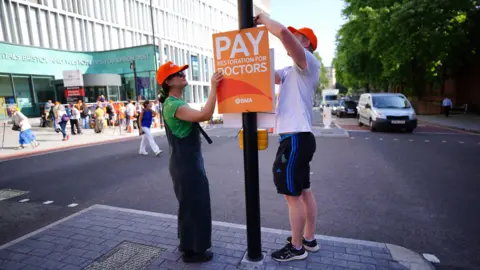In a significant development within the healthcare sector, the British Medical Association (BMA) and the government are poised to recommence negotiations aimed at resolving the ongoing dispute involving resident doctors in England. This pivotal announcement follows a recent meeting between BMA leaders and Health Secretary Wes Streeting, held just after a five-day strike at the end of July, which was marked as one of the many industrial actions taken by doctors since early 2023.
The negotiations are seen as a “window for discussions,” indicating a temporary halt on strike actions while a series of talks are expected to unfold in the upcoming weeks. The BMA’s leadership has asserted this development as a positive step towards finding common ground. This comes against the backdrop of Health Secretary Streeting’s prior statement, in which he expressed a willingness to engage further but firmly maintained that discussions regarding salary adjustments would not be entertained, citing that resident doctors had already experienced salary increases amounting to nearly 30% over the past three years.
The earlier discussions, which took place before the recent strike, concentrated primarily on aspects such as career progression, overall working conditions, including rota management, and the recruitment of out-of-pocket expenses associated with examinations. The nuances of these conversations have been acknowledged by the BMA as “informative,” suggesting a deeper mutual understanding between both parties compared to previous exchanges. While the union has agreed to work collaboratively on non-salary related issues, it continues to emphasize that wages must remain a topic of negotiation.
One critical aspect that the BMA outlines is the reality that, despite reported pay increases, resident doctors are bearing the brunt of inflationary pressures, leaving their earnings around 20% lower in real terms compared to 2008 figures. This disparity underscores the persistent financial challenges that many junior doctors face, compounding the urgency for a resolution.
As articulated by co-chairs Dr. Ross Nieuwoudt and Dr. Melissa Ryan of the BMA’s resident doctors committee, the agreement to negotiate is seen not only as a platform for dialogue but also as an opportunity to avert further strikes, thus providing essential time to explore viable solutions. Importantly, they raised concerns regarding job shortages post the second year of training, where a significant number of resident doctors transition to specialty training. This year alone saw over 30,000 applicants vying for 10,000 jobs available in this phase, a scenario illustrating profound competition, which may include international medical graduates.
The representation of resident doctors constitutes nearly half of the NHS medical workforce, ranging from newly graduated medical professionals to those with substantial experience in the field. A spokesperson from the Department of Health and Social Care characterized the recent meeting as constructive and conveyed the government’s commitment to continue dialogues over the summer, aiming to prevent disruptions to NHS services and patient care.
However, the spokesperson noted that while discussions around non-pay items will persist, the government holds firm on its stance regarding pay negotiations this fiscal year, indicating that while there’s an inclination to address additional training costs and work-related expenses for resident doctors, salary adjustments might not be feasible at this time.
In conclusion, the restart of talks between the BMA and the government marks a crucial point in the ongoing saga of the resident doctors’ dispute. With both sides acknowledging the need for discussions, the outcome of these negotiations could have significant implications for the future of the medical workforce, patient care, and the operational dynamics within the NHS in England.











